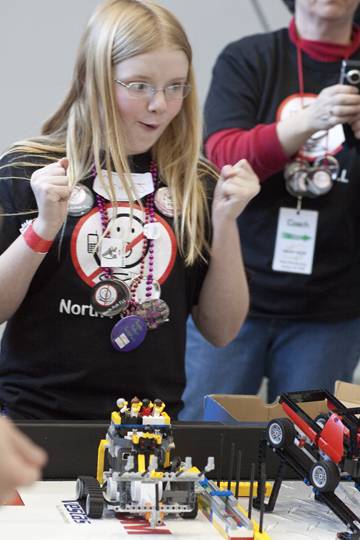First Lego League championship draws aspiring engineers to ISU campus

Sarina, sixth grader from North Polk, watches her teams robot as it clears its first challenge at the Lego League, Saturday January 16, 2010 in the Howe Hall atrium. Photo: Rashah McChesney/Iowa State Daily
January 18, 2010
Howe Hall was bursting with aspiring engineers Saturday, when the annual FIRST LEGO League championship brought 72 teams from all over Iowa to the ISU campus.
The competition was based on two components: A robot that maneuvered a course, and a research project that was presented to a board of judges. The competition’s whole program tied into issues and innovations in transportation, so its theme was labeled “Smart Move.”
North Polk’s team, FLL, left the competition with an award for its track design and light sensors. FLL was made up of sixth-grade Extended Learning Program students. This was the team’s first year competing.
Team member Matthew Merkley explained that there were many attachments for picking up loops on the track, guide wheels for walls and sensors to help with precision on the team’s robot.
“We used ultrasonic sensors to detect how far away obstacles were,” said team member Miranda Noack.
Programming was Noack’s favorite part of the competition. The team was new to LEGO Mindstorms, the program used to maneuver the robots, so it was a learning process from the very beginning.
Teams designed three different programs for their robots. Each program maneuvered a different part of the table.
Every team competed in three matches. The score from the best match was used for the final scoring. FLL’s best score was 310 out of 400 points.
Both parts of the competition were equally important, said coordinator and announcer Brandon Newendorp, graduate student in human computer interaction.
Robots designed for the competition were required to be completely autonomous. They were previously programmed to maneuver a 4-feet-by-8-feet table with obstacles and challenges.
The participants learned how to program the robots with sensors to detect the objects they needed to move or retrieve.
The research portion of the competition had three main aspects: identify a problem — in this case, dealing with transportation — find a creative and innovative way to solve the problem and present a solution.
Teamwork and professionalism were also factors. The competition was about the whole package, Newendorp said.
FLL chose the dangers of texting and driving for its research project.
First, the team gathered information from the Web, local professionals and polls taken at its high school, which members then put into a presentation.
Posters and hand-outs were distributed, discouraging texting while driving, along with publishing articles in the school newspaper and The Des Moines Register.
In the competition presentation, members informed spectators and judges that drivers are 23 times more likely to get into a crash if they are texting.
Students presented a video they had edited, and performed a rap about safe driving and texting habits.
Finally, every team presented its robot to a panel of judges. Teams were asked questions about the structure of the robot and the programs it ran on.
FLL members said their robot’s most unique aspect was the treads they used in place of wheels for some of the table course maneuvers.
The day’s excitement ended with the closing ceremony. ISU a capella vocal group Shy of a Dozen performed, raffle prizes were given away and “the wave” even made an appearance.
Awards were given in several categories, and the final championship award was based on every aspect of the competition: teamwork, research, the robot and professionalism.
The winning team received an invitation to the World Festival that will take place in April in Atlanta, Ga.
The Data Dragons from Omaha, Neb., took first place, followed by the Mount Vernon Robostangs in second place and the Robo Cards from Maquoketa in third place.
“It’s a fabulous and broad experience for the kids,” said parent Helene Bergen. “I’ve never seen something like it, with the programming, teamwork and service projects. I think it’s great.”
















